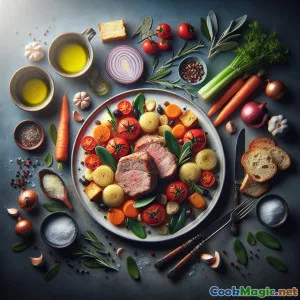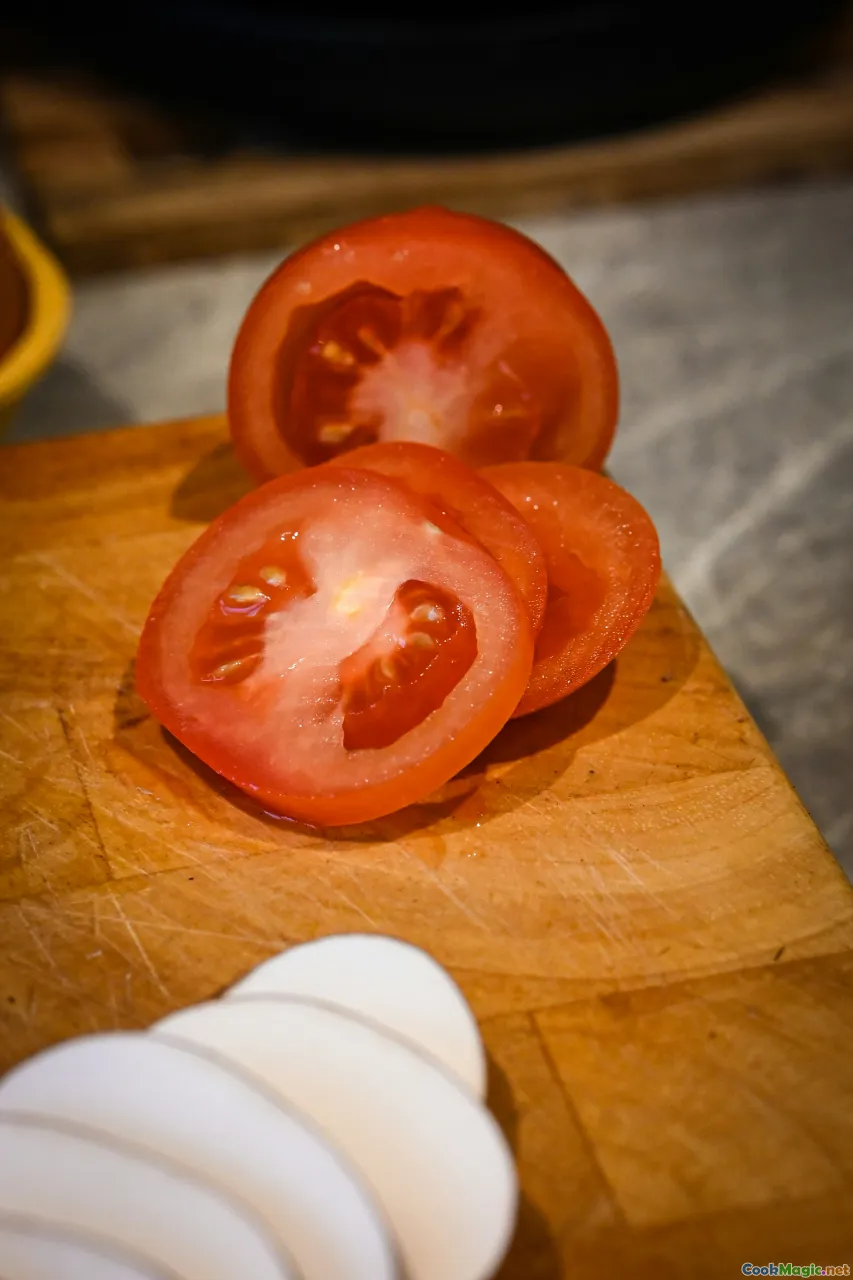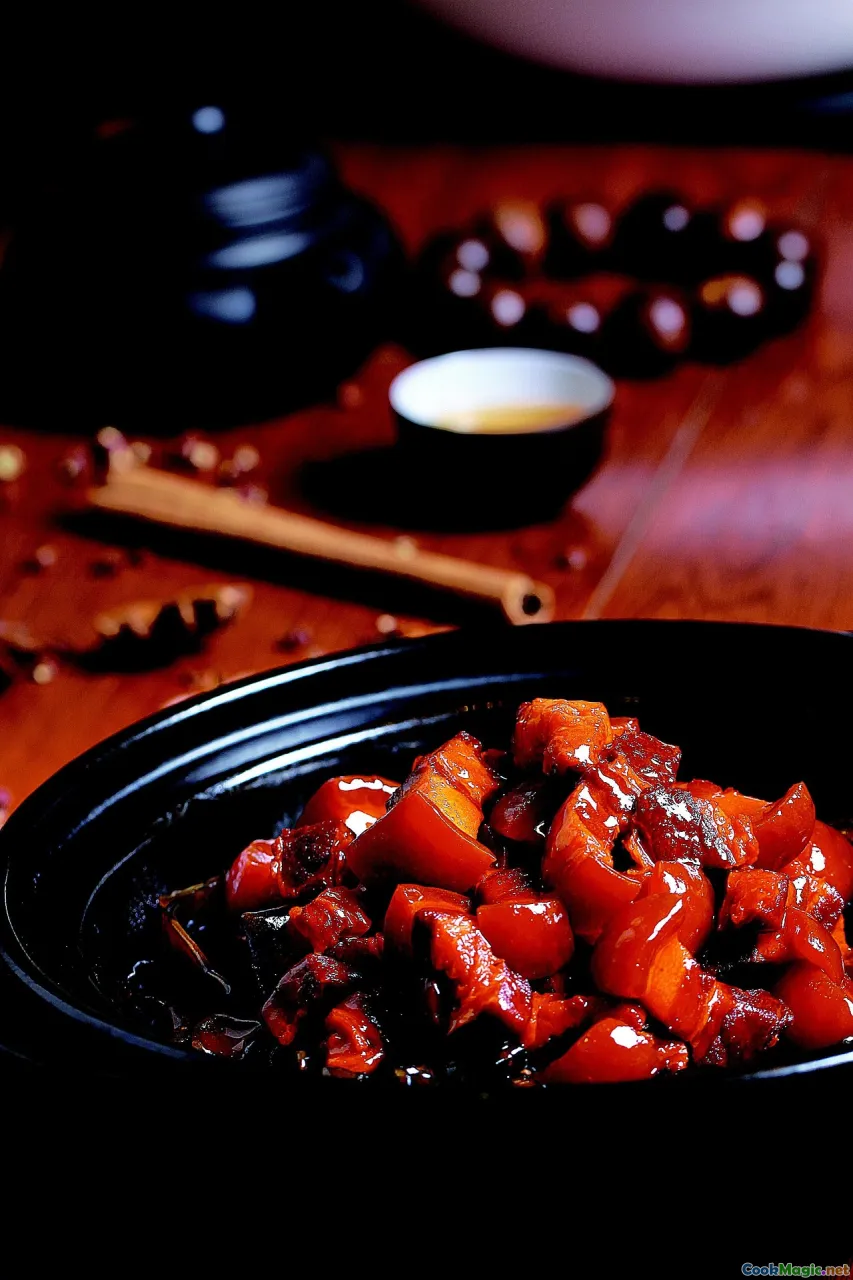
Tuscan Braised Pork Cutlets in Savory Tomato Sauce
(0 Reviews)0
3,259
August 20, 2025
Report a Problem
Ingredients
-
600 grams Pork loin cutlets
(Thinly sliced, boneless)
-
60 grams Stale country bread
(Crumbed; for crust and thickening)
-
400 grams Peeled tomatoes
(Use San Marzano if possible)
-
1 small Yellow onion
(Finely chopped)
-
1 small Carrot
(Finely diced)
-
1 medium celery stalk
(Finely diced)
-
2 medium Garlic cloves
(Crushed)
-
45 ml Olive oil
(extra virgin)
-
6 leaves Fresh sage leaves
(Whole or chopped)
-
2 sprigs Fresh rosemary
(Leaves finely chopped)
-
25 grams Unsalted butter
(For added richness)
-
80 ml dry white wine
(Pinot Grigio or Trebbiano preferred)
-
1.5 tsp Salt
(To taste)
-
1 tsp Black pepper
(Freshly ground, to taste)
-
0.5 tsp Lemon zest
(Freshly grated)
(Thinly sliced, boneless)
(Crumbed; for crust and thickening)
(Use San Marzano if possible)
(Finely chopped)
(Finely diced)
(Finely diced)
(Crushed)
(extra virgin)
(Whole or chopped)
(Leaves finely chopped)
(For added richness)
(Pinot Grigio or Trebbiano preferred)
(To taste)
(Freshly ground, to taste)
(Freshly grated)
Nutrition
- Servings: 4
- Serving Size: 1 plate (250g)
- Calories: 445 kcal
- Carbohydrates: 29 g
- Protein: 39 g
- Fat: 18 g
- Fiber: 4 g
- Sugar: 8 g
- Sodium: 1290 mg
- Cholesterol: 110 mg
- Calcium: 60 mg
- Iron: 3.6 mg
Instructions
-
1 - Prepare Braising Base:
Heat olive oil in a wide, heavy pan over medium heat. Sauté onion, carrot, celery, and garlic until golden and aromatic, about 8-10 minutes.
-
2 - Brown Cutlets:
Lightly season pork cutlets with salt and pepper. Increase heat slightly, add to the vegetables, and sear until golden on both sides, about 4 minutes per side.
-
3 - Deglaze and Add Wine:
Pour wine over the meat, scraping up any browned bits. Let it evaporate for 2-3 minutes.
-
4 - Build Flavor:
Add chopped sage, rosemary, and crumbed bread. Stir gently to coat cutlets and enrich the aromatics.
-
5 - Braise with Tomatoes:
Pour in peeled tomatoes, crushing with hands or a fork. Season with remaining salt, pepper, and add optional lemon zest for brightness.
-
6 - Simmer Gently:
Cover loosely and simmer on the lowest heat for 40-45 minutes. Flip cutlets once or twice until meltingly tender, sauce thick and hearty. Stir in butter at the end if using.
-
7 - Rest and Serve:
Turn off heat, let rest covered for 5 minutes. Serve hot, spooning sauce over cutlets. Enjoy with rustic bread or polenta.
Heat olive oil in a wide, heavy pan over medium heat. Sauté onion, carrot, celery, and garlic until golden and aromatic, about 8-10 minutes.
Lightly season pork cutlets with salt and pepper. Increase heat slightly, add to the vegetables, and sear until golden on both sides, about 4 minutes per side.
Pour wine over the meat, scraping up any browned bits. Let it evaporate for 2-3 minutes.
Add chopped sage, rosemary, and crumbed bread. Stir gently to coat cutlets and enrich the aromatics.
Pour in peeled tomatoes, crushing with hands or a fork. Season with remaining salt, pepper, and add optional lemon zest for brightness.
Cover loosely and simmer on the lowest heat for 40-45 minutes. Flip cutlets once or twice until meltingly tender, sauce thick and hearty. Stir in butter at the end if using.
Turn off heat, let rest covered for 5 minutes. Serve hot, spooning sauce over cutlets. Enjoy with rustic bread or polenta.
More About: Tuscan Braised Pork Cutlets in Savory Tomato Sauce
Bracioline Rifatte alla Pistoiese: Embracing Tuscan Tradition
Originating from the picturesque town of Pistoia in Tuscany, 'Bracioline Rifatte alla Pistoiese' is an exquisite representation of rustic, home-cooked Italian mastery. This dish takes inspiration from classic 'braciola' (cutlet or chop) recipes, but with a uniquely Pistoian twist: instead of merely grilling or pan-frying the cutlets, they're slowly braised with aromatic vegetables, fresh herbs, crumbed stale bread, and luscious tomatoes — transforming humble pork into a sumptuous and deeply flavored entree.
Culinary Heritage: The Taste of Pistoia
Pistoia, located to the northwest of Florence, is renowned for its resourceful food traditions rooted in "cucina povera", the peasant approach to cooking that utilizes every stale bread crumb, herb sprig, and seasonal vegetable for maximum flavor and sustainability. Here, recipes like 'rifatte' (meaning "done-over" or "refashioned") are common, rescued by thrifty cooks who refused to let good bread or precious ingredients go to waste. The addition of bread doesn’t just thicken the sauce, but infuses it with additional body and depth, subtle reminders of Tuscany’s love of heart and hearth.
Preparation Insights and Tips
- Meat Selection: Pork loin cutlets provide juicy, yet lean, swaths of meat that melt into tenderness by the end of a long braise. Ensure the slices are no more than 1cm thick to absorb the sauce’s aroma entirely.
- Braising Base: The trinity of onion, carrot, and celery forms the vegetable soffritto — a signature of Italian cuisine. Sauté them to a golden hue for best flavor. Garlic, absorbed slowly during the braise, elevates the complexity without becoming sharp.
- Wine Choice: A dry white wine blunts the richness and gives the sauce a slight, pleasant acidity — supporting the sweetness of the tomatoes without overwhelming the palate.
- Crumbed Bread: This distinguishes this Pistoiese recipe from many broader Italian braciola. The bread absorbs the tomato and fat from the pork, yielding a rustic yet velvety sauce. If you crave a slightly crisper result, add a few new breadcrumbs to the finished sauce just before serving, stirred in to thicken further.
- Herbs and Freshness: Tuscan sage and snipped rosemary are intrinsic, lending aromatic gravitas — but the finishing touch of lemon zest, though optional, lifts the sauce in a modern flourish.
Serving & Storage
- Classic Companion: Delicately spoon the saucy cutlets atop grilled country bread for the ultimate comforting meal — though soft polenta or mashed potatoes also works gorgeously.
- Wines: Serve with a local Tuscan white or a light Sangiovese red; the subtle tannins gently refresh the palate between mouthfuls.
- Reheating: Braised meats like these only deepen in flavor with a night spent in the fridge. Gently reheat over a low flame, adding a splash of water or more tomatoes if necessary.
Cultural Significance
For locals, this dish isn't merely dinner: it's an act of preserving generational memory, where grandmothers passed on their trusty ciotole (earthenware casseroles) and their knack for timing the perfect braise. Served for family Sundays, at local sagre (fairs), or with friends crowding around a country farmhouse table, 'Bracioline Rifatte alla Pistoiese' invokes the warmth and timelessness of a meal meant to foster community.
Unique Aspects
While Italian cuisine is sometimes stereotyped as fast and saucy, this dish is profoundly slow and cared-for, a testament to layered flavor revealing itself only through patience. The textural embrace between tender pork and hearty bread sauce is rare, yet quintessentially Tuscan. For adventurous cooks outside Italy, it's a perfect bridge between familiar European ingredients and novel techniques seldom seen elsewhere outside of Central Italy.
Personal Notes
I’ve found few dishes as unexpectedly comforting as this one—you’ll marvel at how the stale bread acts almost as a secret ingredient, transforming a basic sauce into richly nostalgic accompaniment that's hard to resist. If adaptable, try swapping pork for veal or even chicken to access other regional and seasonal traditions — the basic method always shines through.
Though rarely spotted on restaurant menus beyond Tuscany, this recipe deserves a cherished spot on your dinner rotation. Bring culinary Italy to your home and savor every luscious, saucy bite, seasoned not just with salt and sage, but with centuries of Tuscan hospitality.
























